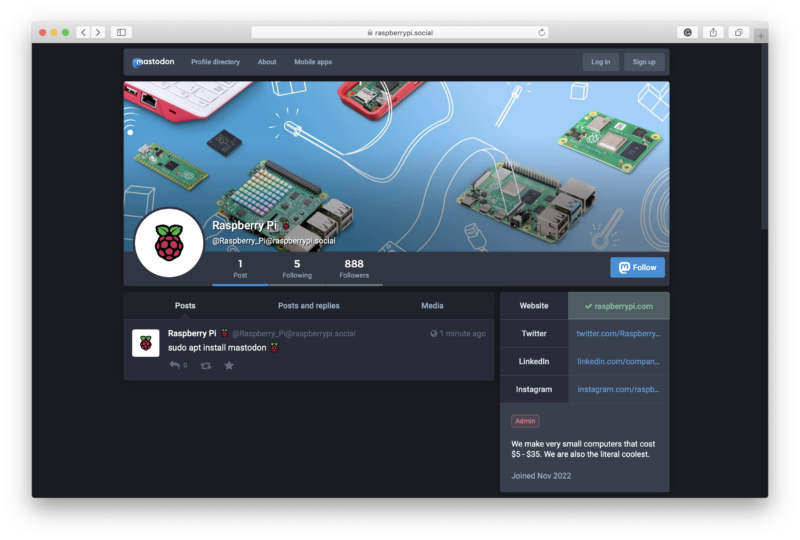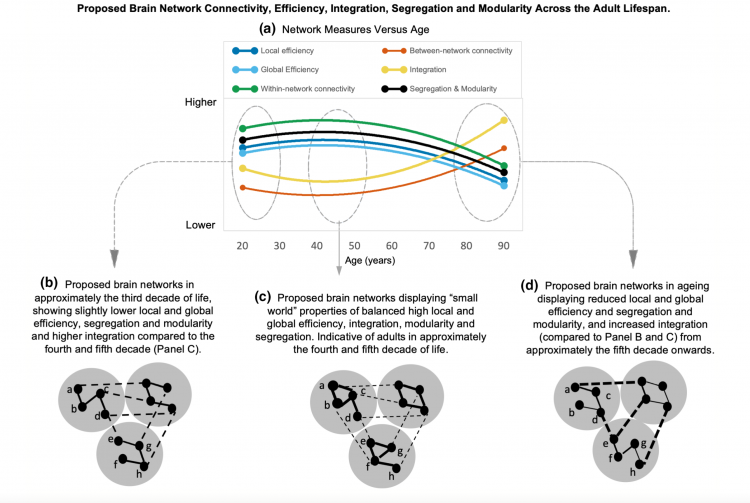2022
- Thesis: Trump’s effort to consolidate an authoritarian nationalism
- Antithesis: opposition from neoliberal tycoons in Silicon Valley
- Synthesis: Elon Musk buys Twitter
Organisations are not just joining the Fediverse, they're setting up their own instances
It’s great to see that Raspberry Pi Ltd. and other organisations are setting up their own servers. Not only does it enable them to verify themselves, but that of their employees and affiliates really easily.
I’m sure it won’t all be smooth sailing ahead for the Fediverse, especially when it comes to trust and verification. But I’m optimistic that the recent migration from Twitter is ultimately for the good of the human species.
We’ve opted to host our own instance. We’ve done this because, with multiple instances out there, we had to decide how to make sure people following us knew that our Raspberry Pi account was the “real” one.Source: An escape pod was jettisoned during the fighting | Raspberry PiDistributed systems are an interesting corner case when it comes to trust. Because when it comes to identity, you eventually have to trust someone. Whether that’s a corporation, like Twitter, or a government, or the person themselves. Trust is needed.
With Mastodon the root of trust for identity is the admin of the instance you’re on, and the admins on all the other instances, where you’re trusting them to remove “fake” accounts. Or, if you’re running your own instance, then it’s the domain name registrars. The details of our domain registration of the
raspberrypi.socialdomain may be redacted for privacy, but our domain registrar knows who we are, and is the same registrar we use for all our other domains. They trust our government-issued identity to prove that we are Raspberry Pi Ltd. You can trust them, they trust the government, and ultimately the government trusts us because they can use Ultima Ratio Regum, the last argument of kings.
A cluttered desk is a sign of genius
Perhaps it's because I'm not a designer like the author of this post, but organising your desk space like this leaves me cold. My space looks like this.

I’m proud of what I’ve done with my desk setup over the last five years. Through careful observation of what’s working and what’s not, I’ve continued to improve how it serves my creative pursuits. Still, when I look at it in the morning, I get a rush of creative energy and optimism.
Source: The Evolution of the Desk Setup | Arun
Quotation-as-title comes from a plaque my father had on his (spectacularly untidy) desk...
Decentralising online learning
A “technical presentation that is structured and designed for a non-technical audience” by Stephen Downes. With the Twitter lifeboats again being deployed, this is a timely look at how federated and decentralised technologies can be used for removing the silos from online learning.
Source: Open Learning in the Fediverse | Stephen DownesAs a new generation of digital technologies evolves we are awash in new terms and concepts: the metaverse, the fediverse, blockchain, web3, acitivitypub, and more. This presentation untangles these concepts and presents them from the perspective of their impact on open learning.
Presenteeism, overwork, and being your own boss
I spend a lot of time on the side of football pitches and basketball courts watching my kids playing sports. As a result, I talk to parents and grandparents from all walks of life, who are interested in me being a co-founder of a co-op — and that, on average, I work five-hour days.
This wasn’t always the case, of course. I’ve been lucky, for sure, but also intentional about the working life I want to create. And I’m here to tell you that unless you at least partly own the business you work for, you’re going to be overworking until the end of your days.
Hidden overwork is different to working long hours in the office or on the clock at home – instead, it’s the time an employee puts into tasks on top of their brief. There are plenty of reasons people take on this extra work: to be up to speed in meetings; appear ‘across issues’ when asked about industry developments; or seem sharp in an environment in which a worker is still trying to establish themselves.Source: The hidden overwork that creeps into so many jobs | BBC WorklifeThere are myriad ways a person’s day job can slip into their non-working hours: think a worker chatting to someone from their industry at their child’s birthday party, and suddenly slipping into networking mode. Or perhaps an employee hears their boss mention a book in a meeting, so they download and listen to it on evening walks for a week, stopping occasionally to jot down some notes.
[…]
However, for many, this overwork no longer feels like a choice – and that’s when things go bad. This can especially be the case, says [Alexia] Cambon [director of research at workplace-consultancy Gartner’s HR practice], when these off-hours tasks become another form of presenteeism – for instance, an employee reading a competitor’s website and sharing links in a messaging channel at night, just so they can signal to their boss they’re always on. “We’re seeing… more employees who feel monitored by their organisations, and then feel like they have to put in extra hours,” she says.
As such, this hidden overwork can do a lot of potential damage if it becomes an unspoken requirement. “If there’s more expectation and burden associated with it, that’s where people are going to have negative consequences,” says Nancy Rothbard, management professor at The Wharton School of the University of Pennsylvania, US. “That’s where it becomes tough on them.”
Hyperfinancialisation has taken over UK politics
I’m reading This Could Be Our Future by (Kickstarter co-founder) Yancey Strickler at the moment. It rails against hyperfinancialisation and then provides a way of thinking about the world differently.
As this opinion piece in The Guardian points out, we need a way of thinking about politics and the market which isn’t driven (literally!) by investment bankers.
Rishi Sunak’s first job was at the US investment bank Goldman Sachs. He went on to spend 14 years in the sector before becoming an MP. In many ways, his unelected appointment marks the highpoint of big finance’s takeover of Britain’s political and economic system – a quiet infiltration of Westminster and Whitehall has been taking place over several decades and gone largely unremarked.Source: With Rishi Sunak, the City’s takeover of British politics is complete | Aeron Davis[…]
Looking at the coalition government, every senior figure who managed Treasury economic policy – George Osborne, Danny Alexander, David Cameron, Rupert Harrison, John Kingman and Nick Macpherson – later gained well-paid positions in the financial sector. And three of the last five chancellors have come from the sector. Jeremy Hunt’s current advisers all come from investment banking.
This matters because investment bankers have very little to do with the real economy that ordinary people inhabit. They don’t run businesses. They don’t deal with actual product and customer markets. Their work is confined to financial markets, aiding corporate financial manoeuvres, and trading and managing their own financial assets. Their primary aim is to make profits from such activities, regardless of how it affects the real economy, the national interest or employees. If that means shorting the pound or breaking up a successful company for quick profits, then so be it.
[…]
And an overpowered financial sector has certainly not been conducive to good governance, either. There’s nothing democratic about extensive public service cuts being used to pay for saving the private banking sector, as in the aftermath of the 2008 crash, or the bond markets determining the credibility of governments, or the fact that the bankers and hedge funds are the biggest single source of Conservative party donations. Nor is trust in British democracy likely to be enhanced by a super-rich PM who has allegedly avoided taxes and made a fortune as a financier at the nation’s cost.
An anarchist take on the Twitter acquisition
I’m quoting this liberally, as it’s excellent. I was on Twitter from almost when it began in January 2007 through to late 2021 and the journey from protest tool to toy of plutocrats has been brutal.
What if Trump had been able to make common cause with a critical mass of Silicon Valley billionaires? Would things have turned out differently? This is an important question, because the three-sided conflict between nationalists, neoliberals, and participatory social movements is not over.Source: The Billionaire and the Anarchists: Tracing Twitter from Its Roots as a Protest Tool to Elon Musk’s Acquisition | CrimethIncTo put this in vulgar dialectical terms:
Understood thus, Musk’s acquisition of Twitter is not just the whim of an individual plutocrat—it is also a step towards resolving some of the contradictions within the capitalist class, the better to establish a unified front against workers and everyone else on the receiving end of the violence of the capitalist system. Whatever changes Musk introduces, they will surely reflect his class interests as the world’s richest man.
[…]
[I]nnovative models do not necessarily emerge from the commercial entrepreneurism of the Great Men of history and economics. More often, they emerge in the course of collective efforts to solve one of the problems created by the capitalist order. Resistance is the motor of history. Afterwards, opportunists like Musk use the outsize economic leverage that a profit-driven market grants them to buy up new technologies and turn them definitively against the movements and milieux that originally produced them.
[…]
Musk claims that his goal is to open up the platform for a wider range of speech. In practice, there is no such thing as “free speech” in its pure form—every decision that can shape the conditions of dialogue inevitably has implications regarding who can participate, who can be heard, and what can be said. For all we might say against them, the previous content moderators of Twitter did not prevent the platform from serving grassroots movements. We have yet to see whether Musk will intentionally target activists and organizers or simply permit reactionaries to do so on a crowdsourced basis, but it would be extremely naïve to take him at his word that his goal is to make Twitter more open.
[…]
Effectively, Musk’s acquisition of Twitter returns us to the 1980s, when the chief communications media were entirely controlled by big corporations. The difference is that today’s technologies are participatory rather than unidirectional: rather than simply seeing newscasters and celebrities, users see representations of each other, carefully curated by those who run the platforms. If anything, this makes the pretensions of social media to represent the wishes of society as a whole more insidiously persuasive than the spectacles of network television could ever be.
[…]
It’s you against the billionaires. At their disposal, they have all the wealth and power of the most formidable empire in the history of the solar system. All you have going for you is your own ingenuity, the solidarity of your comrades, and the desperation of millions like you. The billionaires succeed by concentrating power in their own hands at everyone else’s expense. For you to succeed, you must demonstrate ways that everyone can become more powerful. Two principles confront each other in this contest: on one side, individual aggrandizement at the expense of all living things; on the other, the potential of the individual to increase the self-determination of all human beings, all living creatures.
Twitter the disaster clown car company
I didn’t forsee Elon Musk buying Twitter when I deactivated my verified account about a year ago. But it was already an algorithmic hellscape.
As this article points out, Big Tech no longer really does very interesting stuff technically. It’s all about the politics these days.
[T]he problems with Twitter are not engineering problems. They are political problems. Twitter, the company, makes very little interesting technology; the tech stack is not the valuable asset. The asset is the user base: hopelessly addicted politicians, reporters, celebrities, and other people who should know better but keep posting anyway. You! You, Elon Musk, are addicted to Twitter. You’re the asset. You just bought yourself for $44 billion dollars.Source: Welcome to hell, Elon | The Verge[…]
[Y]ou can write as many polite letters to advertisers as you want, but you cannot reasonably expect to collect any meaningful advertising revenue if you do not promise those advertisers “brand safety.” That means you have to ban racism, sexism, transphobia, and all kinds of other speech that is totally legal in the United States but reveals people to be total assholes. So you can make all the promises about “free speech” you want, but the dull reality is that you still have to ban a bunch of legal speech if you want to make money. And when you start doing that, your creepy new right-wing fanboys are going to viciously turn on you, just like they turn on every other social network that realizes the same essential truth.
[…]
The essential truth of every social network is that the product is content moderation, and everyone hates the people who decide how content moderation works. Content moderation is what Twitter makes — it is the thing that defines the user experience. It’s what YouTube makes, it’s what Instagram makes, it’s what TikTok makes. They all try to incentivize good stuff, disincentivize bad stuff, and delete the really bad stuff. Do you know why YouTube videos are all eight to 10 minutes long? Because that’s how long a video has to be to qualify for a second ad slot in the middle. That’s content moderation, baby — YouTube wants a certain kind of video, and it created incentives to get it. That’s the business you’re in now. The longer you fight it or pretend that you can sell something else, the more Twitter will drag you into the deepest possible muck of defending indefensible speech. And if you turn on a dime and accept that growth requires aggressive content moderation and pushing back against government speech regulations around the country and world, well, we’ll see how your fans react to that.
Image: DALL-E 2
AI is coming for middle management
It’s hard not to agree with this. Things may play out a little different in the EU, but in the USA and UK I can foresee the middle classes despairing.
Legacy businesses will have to rely on retail and hourly support staff to be able to reduce management head count as a means of freeing up money for implementing automation. In order to do that, they will need to implement AI management tools; chat bots, scheduling, negotiating, training, data collection, diagnostic analysis, etc., before hand.Source: AI will replace middle management before robots replace hourly workers | Chatterhead SaysOtherwise, they will be left to rely on an overly bureaucratic and entrenched middle management layer to do so and that solution is likely to come from outsourcing or consultants. All the while, the retail environment deteriorates as workers are tasked to replace themselves without any additional benefits; service declines, implementation falters, costs go up, more consulting required.
Union formation across the retail landscape will force corporations to reduce management head count and implement AI management solutions which focus on labor relations. The once fungible and disposable retail worker will be transformed into a highly sought after professional who will be relied upon specifically for automation implementation.
Image: DeepMind
Being 'quietly fired' at work
I’ll not name the employer, and this wasn’t recent, but I’ve been ‘quietly fired’ from a job before. I never really knew why, other than a conflict of personalities, but there was no particular need for pursuing that path (instead of having a grown-up conversation) and it definitely had an impact on my mental health.
I think part of the reason this happens is because a lot of organisations have extremely poor HR functions and managers without much training. As a result, they muddle through, avoiding conflict, and causing more problems as a result.
There may not always be a good fit between jobs and the workers hired to do them. In these cases, companies and bosses may decide they want the worker to depart. Some may go through formal channels to show employees the door, but others may do what Eliza’s boss did – behave in such a way that the employee chooses to walk away. Methods may vary; bosses may marginalise workers, make their lives difficult or even set them up to fail. This can take place over weeks, but also months and years. Either way, the objective is the same: to show the worker they don’t have a future with the company and encourage them to leave.Source: The bosses who silently nudge out workers | BBC WorklifeIn overt cases, this is known as ‘constructive dismissal’: when an employee is forced to leave because the employer created a hostile work environment. The more subtle phenomenon of nudging employees slowly but surely out of the door has recently been dubbed ‘quiet firing’ (the apparent flipside to ‘quiet quitting’, where employees do their job, but no more). Rather than lay off workers, employers choose to be indirect and avoid conflict. But in doing so, they often unintentionally create even greater harm.
[…]
An employee subtly nudged out the door isn’t without legal recourse, either. “If you were to look at each individual aspect of quiet firing, there’s likely nothing serious enough to prove an employer breach of contract,” says Horne. “However, there’s the last-straw doctrine: one final act by the employer which, when added together with past behaviours, can be asserted as constructive dismissal by the employee.”
More immediate though, is the mental-health cost to the worker deemed to be expendable by the employer – but who is never directly informed. “The psychological toll of quiet firing creates a sense of rejection and of being an outcast from their work group. That can have a huge negative impact on a person’s wellbeing,” says Kayes.
Jacobin reviews the creator of Ethereum's new book
This is written in typical bombastic Jacobin style, and I’ve yet to read Vitalik Buterin’s book, but I have to say I can’t disagree with the conclusion: there is no leftist case for crypto.
Perhaps there was in the beginning? But now it’s easy to see where it’s headed. And it’s not in any way a socialist enterprise.
Their intentions aside, let’s try asking with seriousness: Is there a leftist case for crypto? Helpfully, Ethereum cofounder Buterin has published a book, 'Proof of Stake: The Making of Ethereum and the Philosophy of Blockchains', in which he outlines how cryptocurrencies represent a “new method of social incentivization” that will offer a new democratic “way to pool together our money and support public projects and activities that help create the society we want to see.”Source: There Is No Leftist Case for Crypto | JacobinThe book is helpful, but not exactly in the way Buterin thinks. It reveals how Buterin’s case is wholly, shockingly bereft of a political vision to achieve such a society, let alone a vision rooted in the most basic political and moral principles of the Left. If 'Proof of Stake' is any indication of the existing rhetoric and principles from which one could construct a leftist case for crypto, then no leftist case for crypto can be made. […]
What emerges in 'Proof of Stake'... is not a clearer leftist case for crypto but a clearer sense of Buterin’s essayistic style. The instant a reader wants to hear more about this oft-mentioned equitable world of public goods that crypto can bring us, Buterin scampers back into technical discussions. […]
As a writer, Buterin is the perfect embodiment of crypto as we’ve come to know it: he strays from his technical world long enough to look past the convoluted discourse and glimpse the need for a political framework, but then, whether by fright or disinterest, he returns to his comfort zone. He writes with admirable passion and unusual clarity about these technical issues that his technology is confronting, but the result doesn’t add up to anything resembling a leftist case for crypto — most likely because there isn’t one.
What does work look like? (redux)
If you’re digging a hole or otherwise doing manual work, it’s obvious when you’re working and when you’re not. The same is true, to a great extent, when teaching (my former occupation).
Doing what I do now, which is broadly under the banner of ‘knowledge work’, it can be difficult for others to see the difference between when I’m working and when I’m not. This is one of the reasons that working from home is so liberating.
The funny thing is, sitting alone thinking doesn’t “look” like work. Even more so if it’s away from your computer.Source: What “Work” Looks Like | Jim Nielsen’s Blog[…]
I recently had a conversation with a long-time colleague, someone I know and respect. I found it interesting that even he, who has worked in software since the 90’s, still felt odd when he wasn’t at his computer “working”. After decades of experience, he knew and understood that the most meaningful conceptual progress he made on problems was always away from his computer: on a run, in the shower, laying in bed at night. That’s where the insight came. And yet, even after all these years, he still felt a strange obligation to be at his computer because that’s too often our the metal image of “working”.
Image: Charles Deluvio
It's time to move on from Twitter
It’s almost a year now that I finally deactivated my Twitter account with no intention of going back to it. Like Ben Werdmuller in this article, I had a yearly ‘detox’ from the service. Coming back from it became harder and harder.
Twitter from 2007 to about 2011 (coincidentally the birth years of my children!) was amazing. It was definitely helpful in terms of my career, and I’m still in touch with people who I got to know via Twitter from that period.
But I don’t need it any more. I use various Fediverse accounts and LinkedIn to keep in touch with people personally and professionally. I also don’t share as much of my life as I used to online, partly because the world has changed and partly because therapy showed me it was all part of the mask I’m wearing.
So yes, let’s pour one out for Twitter, which if Musk’s acquisition goes ahead, is going to be a empty husk of what it was formerly. Life moves on.
For a few years, it was tradition that I’d go offline for the year at around Thanksgiving, to give myself some time to recover from the cognitive load of all those notifications. I don’t think the constant dopamine rush is in any way good for you, but the site’s function as a de facto town square has also helped me learn and grow. It’s a health hazard and an information firehose; a community and an attack vector for democracy. More than even Facebook, I think it’s defined the internet’s role in democratic society during the 21st century.Source: The end of Twitter | werd.io[…]
As big tech silos diminish in stature, the all-in-one town squares we’ve enjoyed on the internet are going to start to fade from view. In some ways, it’s akin to the decline of the broadcast television networks: whereas there used to be a handful of channels that entire nations tuned into together, we now enjoy content that’s fragmented over hundreds. The same will be true of our community hangouts and conversations. In the same way that broadcast television didn’t really capture the needs of the breadth of its audience but instead enjoyed its popularity because that’s what was there at the time, we’ll find that fragmented communities better fit the needs of the breadth of diverse society. It’s a natural evolution.
It’s also one that demands better community platforms. We’re still torn between 1994-era websites, 1996-era Internet forums, and 2002-era social networks, with some video sharing platforms in-between. We could use more innovation in this space: better spaces for different kinds of conversations (and particularly asynchronous ones), better applications of distributed identities, better ways to follow conversations across all the places we’re having them. This is a time for new ideas and experimentation.
Image: Nathan Dumlao
Bridging the divide
Sure, it’s an advert for beer, but it’s also a brilliant example of how you can bring people together IRL to get to know one another despite seemingly-intractable differences.
[embed]www.youtube.com/watch
Source: This New Heineken Ad is Briliant #OpenYourWorld | YouTube
AI everywhere in education
Jon Dron makes a good point here that we need to put the humanity back into education, otherwise we’re going to have AI everywhere and a completely broken system.
I thought it would be fun, in an ironic kind of way, to use an AI art generator to illustrate this post…
To a significant extent, we already have artificial students, and artificial teachers teaching them. How ridiculous is that? How broken is the system that not only allows it but actively promotes it?Source: So, this is a thing… | Jon Dron[…]
This is a wake-up call. Soon, if not already, most of the training data for the AIs will be generated by AIs. Unchecked, the result is going to be a set of ever-worse copies of copies, that become what the next generation consumes and learns from, in a vicious spiral that leaves us at best stagnant, at worst something akin to the Eloi in H.G. Wells’s Time Machine. If we don’t want this to happen then it is time for educators to reclaim, to celebrate, and (perhaps a little) to reinvent our humanity. We need, more and more, to think of education as a process of learning to be, not of learning to do, except insofar as the doing contributes to our being. It’s about people, learning to be people, in the presence of and through interaction with other people. It’s about creativity, compassion, and meaning, not the achievement of outcomes a machine could replicate with ease. I think it should always have been this way.
Image: DALL-E 2 (“robot painting a picture of a robot painting a picture of a robot, in the style of Rene Magritte”)
Apple Watch Ultra vs The Scottish Highlands
Happy as I am with my Garmin Venu 2s, if I didn’t need to also buy an iPhone to use one, I probably already would have bought an Apple Watch Ultra. Despite my skinny wrists, my recent health scare means that the cellular capability and ECG combined with a more-than-24-hour battery life would seal the deal.
So I was interested in this review by someone who took the Ultra up into the Scottish Highlands. It turns out he loved it.
I don’t think you can properly test a device like this without taking it out into the field. So the day my Ultra arrived, I booked myself onto a sleeper train up to the Scottish Highlands for a three day hiking trip to really see how it performed. I ended up hiking just over 61 miles.Source: Testing an Apple Watch Ultra in the Scottish Highlands | David SmithThe standard Apple Watches are incredibly capable devices, that I’ve used to great utility on countless hiking trips, but using them in that context always felt a bit like I was pushing the boundary of what it was intended for or capable of. Whereas the Ultra is very much designed for the backcountry context. It is more rugged, more long lasting and much easier to read…all while still being 100% an Apple Watch and not compromising any of the features that make a standard Apple Watch so useful.
Our range of legible emotions is being constricted
A typically thought-provoking piece by L. M. Sacasas which, ironically, I’ve got plenty of time to read, process, and react to after getting up ridiculously early this morning!
It’s interesting to read this from a UK context, after an enforced mourning period after the death of the Queen. This piece definitely speaks into that context, about the “range of legible emotions” being “constricted”. After all, you weren’t even allowed to hold up a blank sheet of paper in public.
The rhythms of digital media rush me on from crisis to crisis, from outrage to outrage. Moreover, in rapid succession the same feed brings to me the tragic and the comic as well as the trivial and the consequential. So, it’s not just that I do not have the time or space to think deeply. I also do not have the time or space to feel deeply. I skim the surface of each emotional experience, but rarely can I plumb its depths or sound out its meaning. Consequently, I lose something of the richness of the emotions and miss out on their appropriate consolations. I feel enough to be overwhelmed and depleted, but I cannot inhabit an emotional experience long enough to see it through to its natural fulfillment with whatever growth of character or richness of experience that might entail.Source: Impoverished Emotional Lives | The Convivial Society[…]
The policing of other’s emotional expressions is one sign that the discourse is colonizing our emotional life. Such policing tends to generate an artificiality of (usually negative or critical) emotional expression, and conditions us to avoid certain (usually positive or earnest) emotional expressions. Under these conditions, emotional life is stunted. The range of legible emotions is constricted. Complex or subtle emotional experiences are overwhelmed by the demand for intense and uncomplicated emotional expressions.
Image: DALL-E 2 (“policing emotions, in the style of Leonid Afremov”)
Censorship and the porn tech stack
They say that technical innovation often comes from the porn industry, but the same is true of new forms of censorship.
For those who don’t know or remember, Tumblr used to have a policy around porn that was literally “Go nuts, show nuts. Whatever.” That was memorable and hilarious, and for many people, Tumblr both hosted and helped with the discovery of a unique type of adult content.Source: Matt on Tumblr | Why “Go Nuts, Show Nuts” Doesn’t Work in 2022[…]
[N]o modern internet service in 2022 can have the rules that Tumblr did in 2007. I am personally extremely libertarian in terms of what consenting adults should be able to share, and I agree with “go nuts, show nuts” in principle, but the casually porn-friendly era of the early internet is currently impossible….
[…]
If you wanted to start an adult social network in 2022, you’d need to be web-only on iOS and side load on Android, take payment in crypto, have a way to convert crypto to fiat for business operations without being blocked, do a ton of work in age and identity verification and compliance so you don’t go to jail, protect all of that identity information so you don’t dox your users, and make a ton of money. I estimate you’d need at least $7 million a year for every 1 million daily active users to support server storage and bandwidth (the GIFs and videos shared on Tumblr use a ton of both) in addition to hosting, moderation, compliance, and developer costs.
Image: Alexander Grey on Unsplash
Google Stadia as pandemic fever dream
I think the comment at the end of this article about people being wary of Stadia because Google tends to shut down services is spot-on. I really liked Stadia, and bought five controllers which I either used within our family or gifted.
During the pandemic, I completed Sniper Elite 4 and all of the DLCs via Stadia. I bought FIFA 22 and Cyberpunk 2077 at full-price as I crossed my fingers behind my back hoping the service would survive.
Ultimately, being refunded for hardware purchases and games I bought is a win-win situation for me. I cancelled my Stadia Pro account earlier this year, dabbling first with Xbox Game Cloud via a Razer Kishi, then upgrading my PlayStation Plus account on the PS5, and more recently investing in a Steam Deck.
The good news is that the true Armageddon situation for Stadia customers is not happening. Google is issuing refunds, which will save dedicated Stadia players from potentially losing hundreds of dollars in unplayable games. The post says: "We will be refunding all Stadia hardware purchases made through the Google Store, and all game and add-on content purchases made through the Stadia store." That notably excludes payments to the "Stadia Pro" subscription service, and you won't get hardware refunds from non-Google Store purchases, but that's a pretty good deal. Existing Pro users will be able to play, free of charge, from now until the shutdown date. The controllers are still useful as wired USB controllers, and a campaign is already starting to get Google to unlock the Bluetooth connection.Source: Google kills Stadia, will refund game purchases | Ars Technica[…]
Google Stadia never lived up to its initial promise. The service, which ran a game in the cloud and sent each individual frame of video down to your computer or phone, was pitched as a gaming platform that would benefit from Google’s worldwide scale and streaming expertise. While it was a trailblazing service, competitors quickly popped up with better scale, better hardware, better relationships with developers, and better games. The service didn’t take off immediately and reportedly undershot Google’s estimates by “hundreds of thousands” of users. Google then quickly defunded the division, involving the high-profile closure of its in-house development studio before it could make a single game.
[…]
Google’s damaged reputation made the death of Stadia a self-fulfilling prophecy. No one buys Stadia games because they assume the service will be shut down, and Stadia is forced to shut down because no one buys games from it.
Brexit Britain = hungry kids
As a former teacher, I almost cried reading this. Can someone with some authority and leadership stand up and say not only was Brexit a terrible idea, but the current government’s fiscal “strategy” will absolutely break this country?
Children are so hungry that they are eating rubbers or hiding in the playground because they can’t afford lunch, according to reports from headteachers across England.Source: Schools in England warn of crisis of ‘heartbreaking’ rise in hungry children | The Guardian[…]
One school in Lewisham, south-east London, told the charity about a child who was “pretending to eat out of an empty lunchbox” because they did not qualify for free school meals and did not want their friends to know there was no food at home.
Community food aid groups also told the Observer this week that they are struggling to cope with new demand from families unable to feed their children. “We are hearing about kids who are so hungry they are eating rubbers in school,” said Naomi Duncan, chief executive of Chefs in Schools. “Kids are coming in having not eaten anything since lunch the day before. The government has to do something.”
Your brain rewires itself after age 40
I turn 42 later this year, and this would explain a lot. Not in terms of me being unable to be super-efficient and productive, but just in terms of seeing connections everywhere.
In a systematic review recently published in the journal Psychophysiology, researchers from Monash University in Australia swept through the scientific literature, seeking to summarize how the connectivity of the human brain changes over our lifetimes. The gathered evidence suggests that in the fifth decade of life (that is, after a person turns 40), the brain starts to undergo a radical “rewiring” that results in diverse networks becoming more integrated and connected over the ensuing decades, with accompanying effects on cognition.Source: The brain undergoes a great "rewiring" after age 40 | Big Think[…]
Early on, in our teenage and young adult years, the brain seems to have numerous, partitioned networks with high levels of inner connectivity, reflecting the ability for specialized processing to occur. That makes sense, as this is the time when we are learning how to play sports, speak languages, and develop talents. Around our mid-40s, however, that starts to change. Instead, the brain begins becoming less connected within those separate networks and more connected globally across networks. By the time we reach our 80s, the brain tends to be less regionally specialized and instead broadly connected and integrated.
[…]
“During the early years of life, there is a rapid organization of functional brain networks. A further refinement of the functional networks then takes place until around the third and fourth decade of life. A multi-faceted interplay of potentially harmful and compensatory changes can follow in aging,” the reviewers concluded.

















